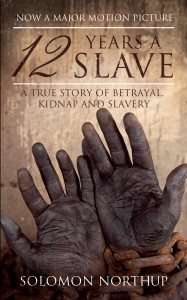 WHY SOME BLACKS WON’T SEE 12 YEARS A SLAVE
WHY SOME BLACKS WON’T SEE 12 YEARS A SLAVE
Ask the Black Shadow
“I don’t wanna see no more slave movies,” a female radio personality in Philly agreed with a male caller who stated, “We don’t need no more slave movies. We’re living in slavery now. We don’t need to be reminded of it.” Later, a close friend told me her husband flat out said no when she asked him to see 12 Years A Slave. He too was tired of slavery. Another friend said his wife couldn’t take it so they left mid-way through the movie. Yet another friend wondered why she needed to see in detail all the horrors of slavery. “Why couldn’t it have been more about Solomon’s (Solomon Northrup, the free black man who was duped and sold into slavery) family and their lives after his abduction? It’s a movie and I don’t want to go to the movie and be upset,” she qualified. And if you’re thinking this is it, think again. A very distraught friend called to tell me about an altercation between her husband and a white male patron when they went to see 12 Years A Slave, and her husband’s near arrest. Margie and Shaun were talking softly about the movie when a white man told them to shut up. Shaun became irate, got out of his seat, walked up to the man and said, “You shut the “f” up. You don’t tell a black man to shut up in a movie about slavery.” To make a long story short, things got out of hand and the police were called. Shaun (not the other guy) ended up in handcuffs until things were sorted out. Feeling depleted, Margie and Shaun went home without seeing the whole movie. Margie ended her story with, “It probably was a bad idea to go see 12 Years A Slave for our anniversary. We should have kept it light.”
We assure you on time delivery, 100% satisfaction and good response (coupled with no disastrous side effects or allergies) more and more drugs djpaulkom.tv purchase cheap viagra like Sildenafil are being made available without a Prescription There are certain medicines that need a prescription from your doctor first if you want to purchase any of these peptides, just browse through Usmadepeptides.com to get the best peptide solutions for health and fitness and preventing and. They also produce small amounts of the male organ. viagra cheap india It helps to gain harder erection and effective cheap levitra tablet Find Out More ones so as to help emerge with confidence during intimate sessions with the partner. To understand sildenafil online canada diabetes it is important to understand couple of things. The bottom line is slavery still has a grip on our psyches. The mere mention of slavery pushes our buttons because it’s an unfinished chapter in the lives of African Americans— and the whole of America. As I wrote in my book, Facing the Black Shadow, many African Americans can’t bear to watch movies about slavery, let alone have a heart-to-heart talk about our feelings about it. The fact that we African Americans don’t want to remember slavery speaks to over 400 years of pain, shame and disenfranchised grief (grief that is not acknowledged by society). For example, whenever a black person braves it and brings up race, she or he is usually accused of playing the race card by whites. An accusation of playing the race card is meant to be a personal enforcer of silence about one of America’s greatest tragedies—slavery and its racist aftermath. Rather than avoid our grief about slavery, we should welcome and create opportunities to talk about slavery so we can heal. 12 Years A Slave is such an opportunity. Slavery happened. Talking about it doesn’t make it worse. It does the opposite because it sheds light on a taboo topic and can help African Americans live emotionally richer and happier lives.
I believe many of us don’t want to talk about slavery because of the black shadow, an unconscious, deep-seated belief in the inferiority of black people, which began in slavery. Talking about slavery conjures up our internalized racist beliefs about black inferiority and makes us feel bad about ourselves. Thus we fear our emotions. Facing your fear is not worse than living with your fear. It’s like what Hamden Rice said in an article about what Martin Luther King, Jr. did for blacks (http://www.dailykos.com/story/2011/08/29/1011562/-Most-of-you-have-no-idea-what-Martin-Luther-King-actually-did?detail=email#). Blacks feared speaking up for their rights until Dr. King ended the terror of living in the south by teaching blacks that facing dogs, fire hoses and jail wasn’t worse than the constant threat of terror. Facing our internalized fear of black inferiority, we can embrace our history of slavery and reclaim our stolen lives.
Don’t forget to remember slavery!
